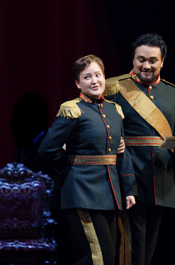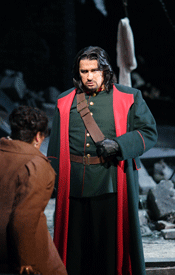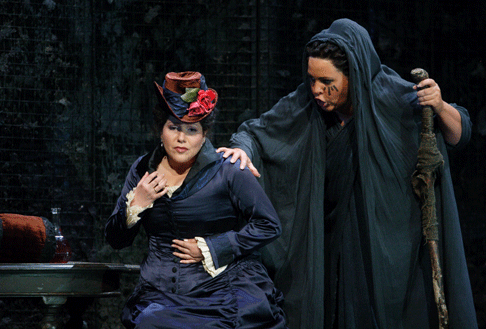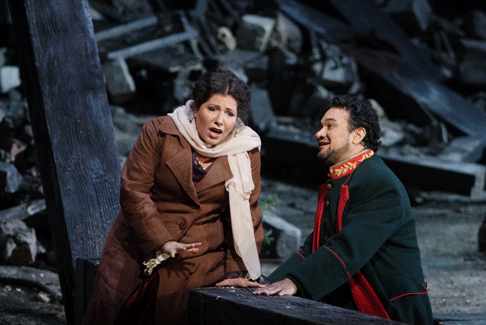29 Jun 2009
Un ballo in maschera at Royal Opera House
On the whole, I’d prefer the conspirators to be sitting on toilets…

On the whole, I’d prefer the conspirators to be sitting on toilets…
No, really, ENO’s ‘controversial’ production of 2002 may have jarred with traditionalists but in many ways it made better sense than this revival of Mario Martone’s 2005 production. Martone is also a film director (cue groans from those who hated Kiarostami’s ‘Così’) and the opera is conceived as a series of tableaux, from the staid to the spectacular, but without much in the way of personenregie. The original production could boast of Mattila, Hampson and Álvarez in the leading roles, but for this revival the ROH have cast a house debutant soprano, the Chilean Angela Marambio, the Slovakian baritone Dalibor Jenis, and Ramón Vargas, and of the three it is only the tenor who produces a genuinely Verdian sound.
 Anna Christy as Oscar and Ramón Vargas as Riccardo
Anna Christy as Oscar and Ramón Vargas as Riccardo
I have to declare a preference for the Danish setting, with the venial King Gustavus biting the dust at the ball — it simply makes more sense to me, all the ‘American’ references in the Boston version sounding daft to my ears, and exactly which Massachusetts ‘castello’ did Riccardo appropriate from his enemy? Of course I’m aware of all the censorship shenanigans, but the story is quite ludicrous enough without adding on any extras. He loves her, but he has preserved her honour? Oh please. Renato entirely fails to recognize his own wife just because she dons a veil? Give me a break. These absurdities can of course be negated in a production which focuses on gripping the emotions and making sense of the politics, but this wasn’t it.
 Dalibor Jenis as Renato
Dalibor Jenis as Renato
Ramón Vargas is yet another of those tenors once tipped to be one of the ‘new Three Tenors’ (groan) but he has survived this nonsense and is actually a fine musician, with a fairly light, flexible voice which he uses with taste and discretion — he lacks the big bow-wow effect beloved of many admirers of this repertoire, but there is no shortage of italianità in the singing, even though ‘Di tu se fedele’ was a little breathy and ‘O qual soave’ was rather thin on passion — that however was not exactly his fault. He did his level best to make something of the role, not exactly helped by either the direction or the Amelia.
Not only do revivals always encourage comparison — and it’s unfortunate in this context that Mattila was such a sympathetic heroine last time around — but they can also suffer from lack of work on the interactions between the principals, something which especially affected Angela Marambio, whose Amelia could blossom if she were able to actually do something on stage other than emote. Her best singing came in ‘Morrò, ma prima in grazia’ where stand and deliver is allowable, but in the Act II duet and at the death scene, she was sorely in need of some direction.
 Angela Marambio as Amelia and Elena Manistina as Ulrica
Angela Marambio as Amelia and Elena Manistina as Ulrica
Dalibor Jenis has an imposing voice and stage presence, and he was often convincing as Renato, although I’m sure he would not be regarded as a genuine Verdi baritone by most aficionados of the breed. ‘Eri tu’ was however grippingly sung, in one of the few believable scenes of the evening. Elena Manistina was a sinister Ulrica, her cries about communing with Satan not once eliciting a chuckle from me — and that’s praise, by the way. Oscar is one of opera’s most irritating parts, but Anna Christy succeeded in not making me wince more than a couple of times — again, a compliment.
Orchestrally things were slow — very slow — although there was plenty of light and shade in Maurizio Benini’s conducting. In terms of the production, who would not love Sergio Tramonti’s wonderful design for the ball scene, with its framed image and brilliant use of mirrors? The only problem was that some of the characters did not quite seem to know what to do with themselves, even as their beloved ‘Governor’ was breathing his last. I liked Ulrica’s bear pit and the Act II gallows, although I imagine the latter was a trial for those who had to walk around in it. The other scenes were deeply conventional, as of course was the feel of the whole evening.
 Angela Marambio as Amelia and Ramón Vargas as Riccardo
Angela Marambio as Amelia and Ramón Vargas as Riccardo
This ‘Ballo’ comes after a starry ‘Traviata’ and before an equally name-laden ‘Barbiere’ so in a way it’s a kind of breathing space, and if you like your Verdi without too many directorial surprises and your singing and acting styles traditional, you’ll be pleased with this production — first night wobbles must have taken the edge off some of the phrasing, and I’m sure that later performances will find all three principals much more settled in.
Melanie Eskenazi